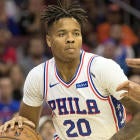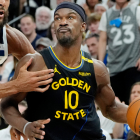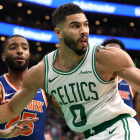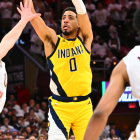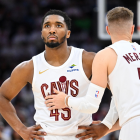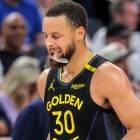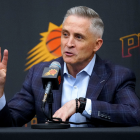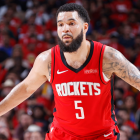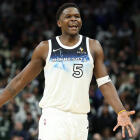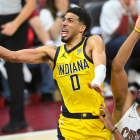One of the all-time criminally underrated baseball movies is Little Big League. It's about a 12-year-old boy named Billy Heywood, who becomes the manager of the Minnesota Twins after his grandfather -- the owner -- dies and leaves him the team in his will. Now, Billy's favorite player has always been a guy named Jerry Johnson, who can't hit a lick anymore and has increasingly little business occupying a spot in a major league lineup. But Billy loves the guy to an almost desperate extreme, and can't stomach the thought of giving up on him.
One game, when Jerry dribbles one through the infield, Billy erupts in the dugout. He's back! Jerry can hit again! This is when Billy's bench coach, Mac, turns to him and says: "Son, don't you think there's a problem when you get this excited over a little seeing-eye single?"
It is a soul-sinking moment of realization that even a 12-year-old can recognize, and it is becoming an almost precise parallel to what we're watching unfold with the Philadelphia 76ers, their fans and Markelle Fultz, whose complete shooting meltdown, both mentally and physically, has reached such dire levels that he is now receiving full-blown standing ovations for rattling in 16-foot jumpers.
Markelle Fultz hit a jumper and literally brought the crowd to its feet. I love it. pic.twitter.com/Fw1etM6hNO
— Jackson Frank (@jackfrank_jjf) October 19, 2018
To answer Mac's question: Yes, this is a huge problem that a former No. 1 overall pick is being celebrated for (barely) executing the most basic of NBA functions. In fact, let's forget for a second that Fultz was drafted No. 1 with legit superstar expectations. I know the guy's still young and all, but the chances of that kind of career ever coming to fruition for Fultz already feel close to impossible. At this point, the Sixers would be thrilled if Fultz merely became a halfway useful NBA player, one who could at least fill a few gaps around franchise players Ben Simmons and Joel Embiid. So far, he hasn't even been able to do that.
Through three games, when Simmons and Embiid are on the court without Fultz, the Sixers have an offensive rating of 108.1 and a defensive rating of 80.0, per NBA.com. When Fultz joins them, the offensive rating plummets to 85.9 and the defensive rating jumps to 98.8. Do the math, and the Sixers, when Simmons and Embiid are on the court with any other three players, are an astounding 41 points per 100 possessions better than they are when Fultz joins them. Small sample size notwithstanding, the dude is dragging his team down like a brick tied to a balloon.
For the year, Fultz is shooting 33.7 percent from the field, a paltry number that looks even worse when you consider that includes a handful of layups. Per synergy, Fultz is shooting 26.3 percent on jump shots, and even that number needs further investigation. For all intents and purposes, there is one shot, and one shot alone, that Fultz looks even halfway comfortable taking (which is to say he doesn't blatantly avoid it): The dribble-in, pull-up midrange jumper. Over and over again, it looks like this:
You'll notice that on every single one of these shots, Fultz gets his momentum going forward with at least one dribble, and in most cases a few dribbles, before he's comfortable rising up. He's able to do this, quite frankly, because the defense is happy to let him shoot his heart out. These are effectively charity shots. The defense is giving them to him, laying 10-15 feet off, hardly even raising a hand in defense of a 12-footer, a luxury no other shooter in the league is afforded, and he's still only making them at a 26-percent clip.
This is not selective editing, by the way, Fultz only taking one kind of shot. Of the 18 jumpers Fultz has taken this year (not counting one half-court heave at the end of a quarter), 17 have been off the dribble and moving forward. It's quite literally the only shot he'll take. He doesn't trust his strength, or his form, or some combination of both, to let fly without the forward momentum of a long jumper. Even the one 3-pointer he hit was of this variety:
Markelle Fultz hits his first NBA 3 and the crowd goes wild. 🔥🤣 pic.twitter.com/BqT1FrFZPJ
— House of Highlights (@HoHighlights) October 19, 2018
Now, compare that to this next clip, where Fultz catches a pass in the corner without a defender in the same zip code as him, but because he's only comfortable shooting after dribbling forward, he inexplicably passes up the single-best shot in basketball (the uncontested corner three) to dribble into traffic.
Fultz has gotta shoot these. Bulls haven't been guarding him out there. pic.twitter.com/roXaDPi0mS
— Stephen Noh (@StephNoh) October 19, 2018
Bottom line: If Fultz cannot find the nerve to at least take that shot (we can worry about him actually making it later), he can't exist in an NBA offense -- particularly Philly's offense. Defenses already sag way back against the Sixers because of Simmons' inability, or unwillingness, to shoot outside 12 feet. Simmons, of course, gets away with this -- for the most part -- because he's a total freak in every other aspect of the game. "He's so special," Charlotte's Nicolas Batum said when I asked him about Simmons. "But, yes, I agree that [a lack of] shooting is maybe the one problem [the Sixers] have to figure out. I'm pretty sure they will."
Far be it from me to question Batum, but I'm not sure I see how the Sixers are going to figure this out. If they add a shooter or two via trade, maybe this conversation changes. But for now, shooting is big problem in Philly. In some ways, it feels like Simmons is getting a pass for his own non-existent shooting because his teammate is so glaringly inept. If Fultz weren't around to command our attention, we'd probably be wondering if Simmons, who was benched for T.J. McConnell in last year's playoffs for the sole fact that he can't shoot, be the main guy on a championship team?
Last season, particularly down the stretch when they won 16 straight to close the regular season and through their first-round playoff victory over Miami, the Sixers covered for Simmons by placing at least three, and oftentimes four, capable 3-point shooters around him -- not just to provide the floor spacing he couldn't -- and still can't -- provide for himself, but also because, very simply, it's hard to consistently get to the rim against defenses completely aligned in walling you off. And the bottom line is you have to put the ball in the basket to win.
This is why you've heard a lot of talk this season about the losses of Marco Belinelli and Ersan Illysaova, because those two shooters flat-out carried Philly for major stretches in last year's playoffs. This season, the Sixers have effectively replaced those two guys with Landry Shamet, a rookie out of Wichita State who has a nice stroke, and Fultz -- who, for the moment, has replaced JJ Redick in the starting lineup.
So now Philly is playing with not one, but two dysfunctional shooters in its startup lineup. That is two defenders who can basically play free safety because they don't have to cover outside 15 feet. That suffocates the middle, not just for penetrators but for Joel Embiid on the block. There have been times when defenders are sagged so far off Simmons and Fultz that they can't get a simple post-entry pass to Embiid.
Sixers coach Brett Brown knows this is untenable, which is why he's only been starting Fultz in the first half. In the second half, it's back to Redick. It begs the question: How long can you tiptoe around Fultz? It's a sad situation that one day is going to make a hell of a 30 for 30, because I'm not sure anyone still knows how the hell this former No. 1 overall pick essentially forgot how to shoot. Maybe it was part injury, maybe it was mental, maybe one precipitated the other. Right now, it doesn't really matter how Fultz and the Sixers got here. They're here all the same. Fact is, if the playoffs started today, there is no way the Sixers could play Fultz for any kind of meaningful minutes, if any minutes at all.
So they'll keep trying to work through this for now, because they're in the East and figure to have some leeway with their playoff positioning. I talked to Orlando Magic shooting coach Bruce Kreutzer, the shot doctor who was instrumental in Kemba Walker going from a 30-percent 3-point shooter to an All-Star marksman -- and Kreutzer likes the way Fultz's mid-range shot looks. He thinks he looks comfortable. Relatively. From the outside looking in, Kreutzer would advise Fultz to take the small amount of comfort he's found on these shorter shots and build on that, to listen to his coaches and block out the outside noise.
"Too many people in his ear is not going to help," Kreutzer told CBS Sports.
These are the right things to say, but the Sixers have been saying them for over a year now. They basically gave Fultz a redshirt year last season. Then they let him skip summer league and all the scrutiny that would've come with that. They talk about all the other things he can do to impact the game besides shooting, but the reality is it's difficult -- if not impossible -- to turn confidence on an off, to avoid one part of the game while confidently attacking the others. The simple truth is you've got an unsure player out there, and now Philly is starting a guy who has no business in an NBA starting lineup. You can only preach patience for so long. You can only say the right things for so long. At some point, Fultz has to do it. We're all rooting for him, but let's be honest: It's not looking good.
![[object Object] Logo](https://sportshub.cbsistatic.com/i/2020/04/22/e9ceb731-8b3f-4c60-98fe-090ab66a2997/screen-shot-2020-04-22-at-11-04-56-am.png)









